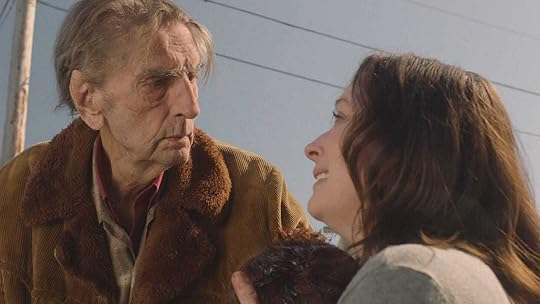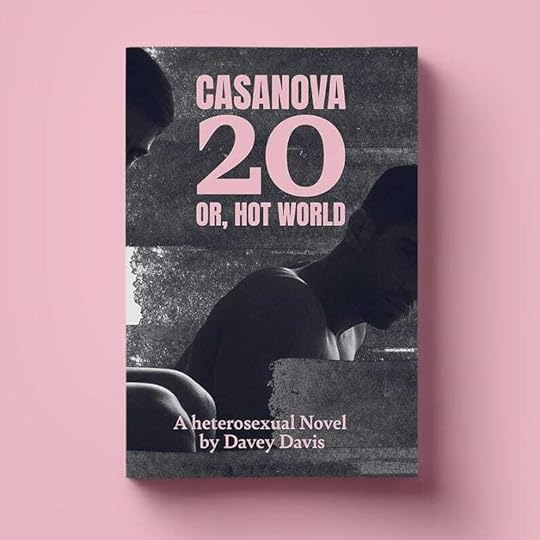Davey Davis's Blog, page 5
January 29, 2025
January 23, 2025
How can nothing be so tiring?

Rather appropriately, watching a David Lynch film is a lot like meditation. Even an enthusiastic viewer of his slow, at times even tedious, films may get bored or sleepy1. (Jade, who remains sturdily conscious for most movies, is herself a Lynchian lotus-eater.) This isn’t to say that nothing interesting or funny or shocking happens. As any Lynch fan knows, they often do. But whether the outcome is dreadful or comedic, the late director’s pacing—with its glacial dialog, measured tracking shots, and self-referential symbolism (architectural chevrons; Hitchcockian molls; trick mirrors)—tends to make work out of paying attention. How can nothing be so tiring? If you’ve ever tried to meditate, you know what I mean by this.
But then the payoff happens. Suddenly a scene, or a series of them, will transcend its own tedium, creating a vacuum that’s instantly flooded with this electrical, indelible feeling. Like my experience of meditation, whether on a yoga mat or a stretcher sheet, Lynch’s movies are made from an effortful slowness that produces, without warning, pleasureful sensations that “addictive” and “satisfying” don’t adequately describe. As happens when I set out to meditate, I must sometimes force myself to turn on a Lynch film, even one that I have already enjoyed. I hope it goes without saying that I almost never regret attempting either.
Some of the Lynchian payoffs that come to mind are musical: Isabella Rossellini or Dean Stockwell singing in Blue Velvet (1986). Others culminate without language, like what happens behind the diner near the beginning of Mulholland Drive (1999). Still others make use of conflicting affects, like fear and titillation, to deliver the viewer into something reminiscent of catharsis, but ultimately more akin to orgasm: a purgative that’s anything but purifying. I’m thinking of the scene in lost Lost Highway (1997) where Alice (Patricia Arquette) is forced to strip by her trick/boyfriend, Mr. Eddy (Robert Loggia), in a room full of faceless mobsters. Oh god, I’m gonna panic, I thought when I saw the henchman raise his gun to her temple. The payoff was that I didn’t, and that when Alice shortly after tells her lover, Pete—who accused her of enjoying this terrifying humiliation—that he will never have her, I had the intensely agreeable urge to climb through the screen and join her in laughing in his face.
While revisiting Twin Peaks: The Return this week, another payoff jumped out at me. In episode 6, an absurdly happy child is hit by a truck on the semi-suburbia of Twin Peaks, Washington. The score takes an abrupt minor turn as the child’s mother (Lisa Coronado) runs into the road, seizing her son’s broken body from the asphalt and wailing into the sky.
The swift tonal transition from uncannily saccharine to melodramatically overwrought2 is almost embarrassing: this boy’s death looks and sounds and feels like a Lifetime movie. (Remember, this is an episode of what was originally an ABC TV drama infamous for reveling in soapy camp like a pig in a fresh puddle of mud). And there are all these details that take you out of the scene. Could the driver that mistakenly waved the boy through the crosswalk have done something more more authentic, than that “Oh, BROTHER” facepalm? Why are none of the dozens of bystanders rushing to help? Isn’t it cringe, the way that Carl (Harry Dean Stanton) watches the boy’s soul depart his body within, or as, one of Lynch’s characteristically lo-fi special effects: a primitive, piss-yellow cloud?
But then Carl goes to where the mother crouches in the street and puts his arm around her. They look into each other’s eyes. We can still hear her cries as the camera floats back to the bystanders, who weep as she does—clinging to each other, holding themselves—and you realize that they have realized that there is no helping a corpse. Unlike them, the mother doesn’t look away from Carl or cover her face. Nor does he look away from her. He doesn’t even flinch. For a few long moments, she suffers nakedly, and he witnesses. The scene ends when the camera moves to a nearby power line crackling with energy. In this payoff, the electrification is literal, as it so often is with Lynch, son of the atomic era.

What would David Foster Wallace, who wrote about the production of Lost Highway in 1996, and who died two years after the creation of Twitter, think of those split-screen TikToks that pair a front-facing video with ASMR (usually of random items being crushed, sliced, or otherwise reconstituted), I guess because we can no longer stomach 30 seconds of standup comedy without something to distract our eyes along with our ears? Would he find them as watchable as I do? Would he, to ask a related question, agree with me that Lynch’s films can be boring or sleepy? I guess what I’m wondering is, how much do I owe my impression of Lynch—that his work is like meditation—to my internet addiction?
Social media conditions us to seek out the most provocative and upsetting content our phones can dredge up, to the extent that anything less than totally engaging is almost unwatchable (there’s that word again: watchable). Seeking the next dopamine hit while avoiding unanticipated3 depictions of violence, targeted ads, and anything else we’d rather not consume at the moment, we’re forced to remain on both the offensive and the defensive, states of arousal in which it’s impossible to be truly curious, only overstimulated. In this perpetual hypervigilance, our every feeling—from anger to amusement—is corroded by paranoia. (To wit: Oh, you thought this was a rabbit?) Being online reminds me of learning how to high-five as a kid, when the excitement of this coordinated connection was haunted by the possibility of the other child pulling away at the last minute (Too slow!) or worse, slapping you upside the head.
As our attention spans succumb to death by a thousand cuts, I wonder about trust’s relationship to time. Which is, incidentally, the only thing you need to meditate, because it’s the only thing you actually have4.
Reminder that I’ll send you a free month of subscriber-only DAVID content if you screenshot your donation to any of fundraiser for Palestinians trying to survive within Gaza or relocate to safety. Gaza Funds is one place to get started.
Thank you for reading and sharing my weekly newsletter. You can also support me by buying my book. Find me on Twitter and Instagram.
1I include all three seasons of Twin Peaks. Cahiers du Cinéma, after all, did refer to the third season as the best film of the decade.
2Feel free to reverse these adjectives at will.
3If not unwanted…
4There are no ideal conditions for meditation, as Lynch confirmed in an anecdote about one of his best sessions, which happened within earshot of a jackhammer.
January 19, 2025
Who can say it? (Part 3)

Earlier this month, shortly after Meta announced a relaxation of its hate-speech rules and suspension of fact-checking for Facebook and Instagram, The Intercept leaked examples of newly permissible language from the company’s internal training materials. Going forward, hate speech like “immigrants are grubby, filthy pieces of shit” and “gays are freaks” are now non-violating on those platforms. This expansion of non-violation also includes trans people, with the transmisogynist “tranny” now no longer considered a “designated slur”12. As others have noted, Meta CEO Mark Zuckerberg appears to be following the lead of Elon Musk, who loosened the rules around hate speech on X (formerly Twitter), except for the word “cis,” which is now considered a slur.
While the targets of these updates are crystal-clear, the language justifying our violation is mostly gibberish. Meta’s propagandistic new “Community Standards” are poorly written, leading to confusing and even contradictory “rules” that will ultimately provide the company with more cover for arbitrary enforcement. On Meta, while “allegations of stupidity, intellectual capacity, and mental illness3” are not permitted, “allegations of mental illness or abnormality when based on gender or sexual orientation” are. Why? Because of “political and religious discourse about transgenderism and homosexuality and common non-serious usage of words like ‘weird.’” (What is this final clause trying to communicate???) On Meta, accusing someone of mental illness is not allowed—unless you are accusing them of being trans or gay (given “common non-serious usage of words like “weird,”” which as we’ve established means nothing). Of course, “mocking people for having or experiencing a disease” is simultaneously not permitted, so even if we were to accept the ableist denigration of mental and physical illness, or disability’s conflation with being trans or gay, by Meta’s own internal logic these things are unacceptable.
In Vittorio de Sica’s Umberto D. (1952)—an Italian neorealist drama about an elderly man struggled to stay housed—the eponymous character gently chastises the girl who works as a maid in his pensione for neglecting her schoolwork. “Certain things can happen if you don’t know your grammar,” he tells her. “Everyone takes advantage of the ignorant.”
Unfortunately, knowing my grammar doesn’t protect me, or anyone, from these so-called Community Standards. While it’s clear that the people who wrote them have no respect for language, it’s unclear how much of this disrespect is strategic, or merely the side effect of an anti-intellectualism so entrenched that the Kafka-esque is now, if not unintentional, then comfortably unconscious. What percentage of these new rules are dog whistles? Parapraxes? The verbal slop served up by dozens of stupid cooks (and their chatbots) crowded into a single stupid kitchen? With social media billionaires like Zuckerberg and Trump—who have already facilitated union-busting, election fraud, genocides, and many other evils—it doesn’t really matter, does it?
Reminder that I’ll send you a free month of subscriber-only DAVID content if you screenshot your donation to any of fundraiser for Palestinians trying to survive within Gaza or relocate to safety. Gaza Funds is one place to get started.
Thank you for reading and sharing my weekly newsletter. You can also support me by buying my book. Find me on Twitter and Instagram.
1Whether this word may be applied to minors is unclear. The leaked materials say that the following is no longer subject to removal: “Look at that tranny (beneath photo of 17 year old girl).” However, Meta spokesperson Andy Stone said that this was a mistake.
2People who aren’t transfeminine can catch strays—I know I do—but we can’t fail to point out that this word is designed to humiliate women specifically.
3One wonders what “allegations of intellectual capacity” could possibly mean…
January 13, 2025
On eating the frog

There’s a productivity technique known as “eating the frog,” which means you tackle the day’s most difficult task first thing in the morning. I’m a frog-eater by training, having been raised by obsessive workaholics who considered waking up at 6am to be sleeping in.
January 7, 2025
What I've been reading and watching
 What I’ve been reading (spoilers)
What I’ve been reading (spoilers)A couple of years ago, I began—then never finished—an essay about the physiological parallels between post-traumatic hypervigilance and the homosocial attunement required for cruising among men (Is there a difference between scared and horny?). A few pages into Daniel Lefferts’ Ways and Means, his protagonist Alistair makes a similar connection as he flees New York City only a few steps ahead of assassination: He realized that keeping an eye out for potential assailants and seeking out biceps and succulent backsides were in effect identical activities: that he registered perusers and possible pursuers with the same hyperacute focus and the same libidinal force. It was as if his suspicion, like a parasite, had taken over the mechanism of his desire. To get the most out of Means, which came out last year, it might help to know a thing or two about psychoanalytic theory. But considering that most of what “we,” as a culture, know of it is largely osmotic, decontextualized, referential—that is to say, unconscious—a working knowledge of Freud isn’t necessary to enjoy this bourgeois-novel-cum-political-thriller1.
The action of Lefferts’ elaborately plotted debut mostly takes place in the year leading up to President Donald Trump’s first term, when Alistair, a white gay undergrad whose expensive education (private school, NYU Stern, etc.) isn’t quite enough to deliver him from middle-class ignominy into the elite lifestyle he believes he so richly deserves. He’s in a triad with Elijah and Mark, two other white gay men who also can’t seem to attain (or in the case of Mark, the second son of a self-made slumlord, retain) the kind of wealth that Alistair can only imagine, despite his good looks and mathy brain. Though all three men are aware of their privileging relative to most other Americans, their inability to exploit it to the hilt is more passive than principled: Alistair yearns for inclusion in the social stratum his liberal arts mother raised him to disdain; rather than get a job, Elijah leeches off an amoral shock artist who trolls 2016 Chelsea in a MAGA hat in hot pursuit of attention; and Mark, considered by all to be a decent guy, fantasizes about running his father’s manufactured housing empire a trifle more justly, but would ultimately prefer to be bailed out by his ill-gotten millions. Through his throuple, the naive and lonely Alistair—at 22, he’s convinced himself that a robber baronetcy is the only way to financially support his downwardly mobile mother, Maura—is brought into elbow-rubbing distance with Herve, a fracking billionaire with a particular interest in desperate young white men. With no postgrad job offer to show for his six figures of student debt, Alistair sleepwalks into Herve’s sinister plot to harness the Trumpist death drive and use the underclass to overthrow the government2. Will he and his boyfriends be able to stop him?
Striking a smart and sensitive balance between subtext (Alistair shrugged weakly, with adolescent helplessness) and text (Mark knew that Alistair’s father had died when he was a child and that his mother never remarried, and he sometimes wondered if Alistair’s involvement with him and Elijah had been his most sustained exposure to a couple), Lefferts breathes authenticity into Alistair, Mark, and Elijah’s messily arrested development. Driving each man’s learned incompetence is a lustful rage for Daddy, which can only be satisfied by usurping or replacing him (as the beginning passage suggests, the word libido appears A LOT in this book). Generally speaking, I find people like these characters largely unsympathetic, and yet our author kid-gloved me into something like grace: how can these failsons be bad people when they’re not even real people? Unlike most disaffecteds, however, our trio’s search for the appropriate love object—that is, another grown-up residing in the present, rather than someone who “can revive in them the picture of the mother and the father,” as Freud wrote—parallels a real-life mission with much higher stakes: the fate of liberal democracy.
Lefferts’ literary talents are so prodigious that Means’ weaknesses—and there aren’t many—have little to do with technique. Sophisticated and controlled, his writing skews more toward impressive than beautiful, which makes its moments of tenderness all the more affecting: in his infancy, Alistair and the doting Maura passed whole days in what it felt beside the point to call happiness. But even his most astute insights are occasionally hampered by a kind of emotional vertigo. His ambitious plot’s fissures tend to gather around behavior that doesn’t quite make sense, even when you account for the ego’s machinations: Herve’s lapses in shrewdness and Maura’s lack of non-motherly dimensions come to mind. Similarly, Lefferts’ ventures into the actual lower classes—that is, the people to whom Alistair is prone to comparing himself, but only when he needs to rationalize his rapacious aspirations—can ring hollow. While on a highly suspicious errand for Herve, he meets a young maintenance guy who immediately knows something’s up and asks the city slicker who he works for. The question was piercing in its intelligence, reports the narrative. It was actually a very normal question for a person to ask, under the circumstances! We learn to expect this condescension from Alistair—whose failure to ask intelligent questions ends up getting him into deep trouble—but every so often it seems to issue directly from his author.
Means’ happy ending completes the puzzle perfectly, with our gays financially secure, returned to the couple form, and freed from their neuroticism while more or less politically unchanged. Perhaps this is why, despite its undeniable brilliance, it’s somewhat dissatisfying to me. Nevertheless, it’s fiercely intelligent and highly entertaining. At turns funny, sexy, and scary, this is the kind of book I want everyone to read so they can talk about it with me. Even now, looking back over this review, I wonder if I’m being too harsh, if I’m projecting my own psychodrama onto a story that, in its final pages, has Maura reflecting thusly: Renounce, renounce! It was the hardest and simplest thing to do. Renounce your object, abandon your singular infatuation, give up whatever yearning blinds you to everything but its endpoint, diverts your energy away from everything but your pursuit, justifies whatever harm, whatever waste, your quest entails. Renounce, renounce, and see how your love flourishes.
What I’ve been watchingFilm
Cecil B. Demented (2000): While far from my favorite John Waters, the charming Demented is one of his most prescient. The vicious glee with which his cult of terrorist filmmakers (his twist on the Symbionese Liberation Army) kidnap a Hollywood darling (Melanie Griffith) and use her as anti-establishment agitprop is only rivaled by Waters’ hilarious lampooning of everything that’s still wrong with the industry 25 years later: IP-mining for mindless prequels and sequels, the elimination of art house and repertory theaters, the slow squeeze on independent filmmakers (Waters himself hasn’t made a movie since 2004’s A Dirty Shame), and the anti-intellectualism that plagues American culture at large.
Babygirl (2024): The sweet Christmas treat that confirmed Kidman’s motherhood and turned me into a Dickhead. Wrote a little toward why I thought Babygirl’s treatment of “kink” worked so well on Twitter.
Kid Galahad (1937): I’m no Bette Davis fan, but her chemistry with the inimitable Edward G. Robinson and the pitch-perfect Wayne Morris is the balance this Curtiz-helmed boxing romp needs. Remade four years later with supporting player Humphrey Bogart as the star in The Wagons Roll at Night, then again in the early sixties for Elvis Presley, Galahad is kind of like if de Palma’s Snake Eyes (1998) was cute, fun, and still didn’t pass the Bechdel test. Jade didn’t care for it, but I had a good time.
Story of Women (1988) and Querelle (1982): The French have been PMO. You know I hated Coralie Fargeat’s substanceless The Substance (2024), with its clunkily-rendered American misogyny; while I quite liked The Beast (2023), its portrayal of the American incel/mass shooter was so off as to, again, veer into misogyny (this review expressed some of my other misgivings very well); I refuse to see Emilia Pérez (2024) because its reputation precedes it (wow, yet more misogyny…), and according to Twitter, Mexican viewers are also not loving a foreigner’s lighthearted and proudly unresearched take on the horrors of drug cartels. Over the past few weeks, I watched two enjoyable French/adjacent films: Isabelle Huppert’s dynamic turn as abortionist Marie-Louise Giraud, one of the last women to be executed in France, in Story of Women, and Fassbinder’s final film, the colorfully concupiscent Querelle, based on the novel by Jean Genet. Consider my palate cleansed.
Evil Does Not Exist (2023): I went into Ryusuke Hamaguchi’s rural drama thinking that it was a horror movie? And it’s not? Which isn’t to say that something horrifying doesn’t happen, but when you spend the first half of a slow-as-melting-snow meditation on harmony, community, and family expecting a jump-scare…well…it definitely does something to the experience. Interesting cinematographic decisions by Yoshio Kitagawa, often more thought-provoking than revealing, for better or worse.
Reminder that I’ll send you a free month of subscriber-only DAVID content if you screenshot your donation to any of fundraiser for Palestinians trying to survive within Gaza or relocate to safety. Gaza Funds is one place to get started.
Thank you for reading and sharing my weekly newsletter. You can also support me by buying my book. Find me on Twitter and Instagram.
1Go ahead and read into that “cum.”
2One of the chapter titles is “Lumpenproletariat,” and I’m still trying to decide how ironic it’s meant to be.
December 30, 2024
Body scan
 Body scan
Body scanEyelashes: Jade says that my eyelashes have gotten thicker since I upped my dose a few months ago. Maybe they just look thicker. Your eyes shrink when you go on T, or so Danny Lavery once joked.
December 23, 2024
Who can say it? (Part 2)

Read Part 1.
My mom tells a story about the afternoon my older sister, then in kindergarten, got off the school bus with a piece of paper taped to her back. On the paper was written a single word in a child’s looping scrawl. The paper came right off, but my mom had to put my sister in the shower to wash her long, red hair—the other kids had spat in it all the way home. While my sister could scream for hours at a stretch or go days without sleep while repeating the same meaningless phrase over and over1, my mom says she seemed untroubled by what had happened. I wasn’t yet old enough to ride the bus, but there would be plenty of future opportunities for me to witness schoolyard humiliations that she didn’t understand, or even appear to notice.
Kids can be so cruel, people say, and it’s true that other children were the primary reason why the r-slur was never neutral for my family. But as my sisters and I learned early on, what children say and do can only be said and done with the approval, tacit or otherwise, of adults. (Why hadn’t the bus driver intervened? Perhaps they hadn’t known what was going on, although experience has taught me to never give the benefit of the doubt in situations like these.) Everyone who’s been bullied knows that while the discovery and exploitation of relative power is a normal part of every child’s development, that power is always on loan from higher up.
I’ve been treating the so-called r-slur resurgence like Whac-A-Mole. Every time someone in my feed uses, shares, or engages with it, I unfollow, mute, or block. Brick by brick, as they say on TikTok: you build the algo you live in and I don’t want that shit in mine. At this point in my life, I can no longer regard its use as a teachable moment, even with acquaintances. Afraid I won’t be able to control my emotions, I do my best to avoid it.
Unfortunately, the desire to avoid hate speech (even the kind not directed at oneself) is an unrealistic one. “They’re saying the r-word again,” says a high school teacher in an episode of FX’s English Teacher2, perplexed by the re-normalization of one of the 90s’ favorite epithets. This joke relies on the idea that the resurgence is generational, but it isn’t merely regaining popularity among Gens Z and Alpha. From Millennials like Azealia Banks to Baby Boomers like Donald Trump, the use of the r-slur is all-ages fun, and the general sense is that it appears to be escalating.
In 2024, there was a lot of speculating about the origins of this resurgence. Some of it is pure narrative, in my opinion: a Special Olympics campaign with an online pledge does not an r-slur recession make. But with the rise in anti-woke (that is, reactionary) aesthetics, it does seem that the r-slur is returning from cultural hibernation. Why?
Social media rewards rage-bait: Writing for Mashable, Christianna Silva makes the dubious claim that the r-slur—which became a pejorative between the 1960s and the 1980s—“all but disappeared from common use by the early 2010s.” They do go on, however, to make the insightful observation that the resurgence reflects “how digital platforms are reshaping cultural norms in a way that seems to prioritize engagement over all else.” And what’s more engaging than outrage? Ann Coulter knew this in 2012, when she called Barack Obama an r-slur on Twitter (now X)3, one year after the White House hosted Lois Curtis, the lead plaintiff in the SCOTUS case that ruled that the unjustified segregation of people with disabilities is discriminatory, and two after the president signed Rosa’s law, legislation replacing federal use of “mental retardation” with “intellectual disability.” The rise of social media was concurrent with the entry of the r-slur into America’s culture wars, a context in which the liberal Obama could pay lip service (and, sure, even make some material concessions) to disabled peoples’ humanity while denying the same to teenagers in Yemen and prisoners in Guantanamo4. While Trump, a Twitter genius on par with the likes of Dril, was banned from the platform in 2021, he was reinstated the following year when it was acquired by Elon Musk, who went on to help bankroll his second presidential win and lead a new advisory commission to “increase governmental efficiency” (i.e., strip the fed for parts). The “reshaping,” as Silva puts it, between social media and culture isn’t unidirectional: with the victory of Trump and Musk, in fact, they finally converge. “As social media platforms like X allow offensive language to spread under the guise of free speech,” Silva writes, “the lines between humor and harm blur, revealing how digital spaces have become battlegrounds for societal norms.” The r-slur is much more heavily censored on sites like TikTok, Facebook, and Instagram. Contrast this failure to create and/or enforce TOS that purport to protect users from hate speech with the creation of slurs where there are none, as Musk has done on X with the word “cis.” (Congresswoman Nancy Mace, however, is welcome to use the t-slur about trans activists, some of whom may even be her own constituents.)
People gotta make a living: This Vox explainer points out that while traditional public figures have reputations to maintain, and thus an incentive to avoid using hate speech unless that’s their niche, influencers do not. When your income relies on engagement farming, “being outrageous,” isn’t a liability, but may in fact be “the whole point.” Unlike the eugenicist millionaires and billionaires they parrot, most people who make an income off their social media followers are doing so without the protections that salaried employees enjoy. As a supplement, if not a replacement for, the formal economy, the attention and gig economies run on rage-bait, generating clicks from moral/sex panics (particularly transphobia), conspiracy theorizing, Zionism, and pretty much any other kind of dehumanization you can think of.
The ongoing COVID-19 pandemic: The disposability of disabled people has only intensified since 2020. It’s not just the capitalists’ “let it rip” and “back to work” approach to what was once called public health. It’s not just the escalation of organized abandonment. It’s not just misinformation about transmission, herd immunity, and vaccines; the devaluing of “vulnerable” populations; the myth of personal responsibility; the lie that the pandemic is “over”; or the abandonment of disabled comrades by progressive and left movements that won’t even prioritize masking. It’s not even just healthcare inequality so severe that the murder of a insurance executive could be received with not just approval, but almost hysterical celebration. It is, in fact, a cultural and political eugenicism so entrenched that even “COVID-conscious” communities reproduce the mainstream’s dehumanization of people with intellectual and developmental disabilities (IDD) in their fight for survival.
Since 2020 I, too, have noticed what seems like an increased comfort with the r-slur, especially among people that I assumed would have a stronger sense of solidarity with some of our most marginalized comrades5. But I think that the word “resurgence” is a little too simple for the phenomenon we’re trying to describe. Was there indeed a window of time in which was the world was less ableist—or was it just that a certain kind of liberalism found it could get traction co-opting disability rights movements, at least for a while?
There’s no debating that language plays a role in the incitement, normalization, and erasure of violence, to such an extent that I refuse to draw a line between “linguistic” (that is, abstracted or metaphorical) and “literal” violence. But as Obama’s signature of Rosa’s law demonstrates, liberals are satisfied with isolating language as both the source and expression of the oppression of disabled people: eliminate the word, eliminate the problem.
To be sure, removing a slur from legal and clinical documents is not meaningless6. But until the oppressive systems underlying hate speech is, reforms like these are little more than bandaids on the the cancer of institutionalized ableism that characterizes racial capitalism as we experience it in this country.

Hypocrisy is permission. When my family was out in public, adults often prevented their children from approaching my sister with honest curiosity. They weren’t being polite—they just didn’t want to be forced to think about her at all. They could chastise their child for staring in the same breath that they would inform my mom that her daughter wasn’t welcome in their school, place of business, or church. Scolding non-disabled children for saying the r-slur is meaningless if you don’t also provide disabled children with unfettered access to the same education and community that other children receive7. In the same way, not being called a slur at the doctor is meaningless if you can’t go to the doctor (or can’t control what happens at the doctor, as is the case of the many disabled people who don’t have the final say in their own healthcare).
At almost 40, my sister still regards young children as her peers. For my whole life, I’ve watched six-, seven-, and eight-year-olds suddenly recognize—often with frustration, occasionally with fascinated scorn—that the person they were until very recently content to watch cartoons with is neither a child like they are nor a grown-up that they must obey. Upon realizing this, some of them respond with cruelty. Not because they’ve outgrown her, but because they want to find out if anyone will stop them.
Reminder that I’ll send you one free month of subscriber-only DAVID content if you send me a screenshot of your donation to any of fundraiser for Palestinians trying to survive within Gaza or relocate to safety.
Thank you for reading and sharing my weekly newsletter. You can also support me by buying my book. Find me on Twitter and Instagram.
1Meaningless to my parents. It clearly meant something to her.
2Yes, I read the Vulture article about the allegations against Brian Jordan Alvarez. All I can say is that I hope all sexual predators get what they deserve.
3I think Obama is literally evil, but there’s not enough time in the day to list the disgusting slurs the contemptible Coulter used for him during his presidency.
4I voted for him in 2008 in large part because he promised to close Guantanamo, which of course he didn’t end up doing. Big lesson for me!
5For our purposes I mean people with IDD, although they’re certainly not the only ones targeted by the r-slur.
6Nor, by the way, was the passage of the Affordable Care Act.
7And in this country, not all of them receive it, anyway.
December 17, 2024
"Casanova 20" has a UK cover

Yesterday, I submitted the final draft of my third novel, Casanova 20: Or, Hot World, to my fabulous editor, Alicia Kroell (who also edited my second novel, X). Today, my UK publisher, the inimitable Cipher Press, released this cover. The timing is coincidental, but the instant gratification is still hitting. Where’s the nearest slot machine?
While the manuscript is finished, there’s still production to do—from copy edits to layout to printing—before Casanova’s release late next year. Feels like ages! Whatever! In the meantime, I’ll have a little more space for this newsletter (not to mention my fourth book…). I know I owe you a few things, including the next installment of my new series on slurs, so stay tuned.
Reminder that I’ll send you one free month of subscriber-only DAVID content if you send me a screenshot of your donation to any of fundraiser for Palestinians trying to survive within Gaza or relocate to safety. Gaza Funds is one place to get started.
Thank you for reading and sharing my weekly newsletter. You can also support me by buying my book. Find me on Twitter and Instagram.
December 6, 2024
Your favorite DAVIDs of 2024

“Every day, once a day, give yourself a present. Don't plan it. Don't wait for it. Just let it happen. It could be a new shirt at the men's store, a catnap in your office chair, or two cups of good, hot, black coffee.”
Anticipating Parks and Rec’s “Treat Yo Self” by two decades, Special Agent Dale Cooper’s sage advice from the first season of Twin Peaks is what comes to mind when I think about this weekly newsletter. For the past five years, DAVID has been the more-or-less daily present that one-ups obligations and chores for no good reason whatsoever. I hope you have a similar release valve in your life, a regular opportunity to be irresponsible and self-indulgent that’s not doomscrolling or bed-rotting. You deserve it!
If you’ve enjoyed my newsletter this year, I’m sending you a gentle reminder that I offer one free month of subscriber-only DAVID content if you send me a screenshot of your donation to any of fundraiser for Palestinians trying to survive within Gaza or relocate. (Streets are saying that multiple donations translate to multiple free months…). Since so many of my most popular posts are paywalled, this is your chance access them for the low, low price of literally any amount of money.
Which side is hell on?: Reading W.G. Sebald’s sensational Austerlitz—about a Jewish architectural historian who uncovers his past as a child refugee of the Nazi annexation and occupation of Czechoslovakia—is a profound experience at any time, but in particular since October 7, 2023.
On gender policies: Other than FAW’s inspired “must be or be accompanied by a woman” rule, gender policies for queer events never sit right with me. Here’s why.
There is no “safe”: my guide for vetting sadists, dominants, and tops: Of the top-ten performing posts this year, four were from this series. This means a lot to me because I consider it to be a community service of sorts. Over my decade in leather, I’ve made a lot of mistakes and wound up in a lot of situations—from fainting in scene to being stalked to getting manipulated by “community” “pillars” looking for someone new to control—and it would be nice if someone other than me could learn from them.
See above.
See above.
See above.
What if it’s a bad pain?: Jade in a fluffy pink dress for Folsom Street Fair. What more do you need?
Navel gazing: What if I got my bellybutton pierced so many times it just fell out?
On “content”: More needles, big ones. I’m sensing a theme here.
Are you having a phobic response to your trauma?: How I turned a body mod into the opportunity to write about psychoanalytic theory.
Bonus | This is not a review of “Poor Things”: This post performed really well last year but was too late for the 2023 roundup, which is a shame, because Poor Things sucked so much ass I had to write about it. It’s also in conversation with my new series on slurs, so consider it recommended reading for DAVIDians1.
Reminder that I’ll send you one free month of subscriber-only DAVID content if you send me a screenshot of your donation to any of fundraiser for Palestinians trying to survive within Gaza or relocate to safety. Gaza Funds is one place to get started.
Thank you for reading and sharing my weekly newsletter. You can also support me by buying my book. Find me on Twitter and Instagram.
1Is referring to DAVID heads like this in poor taste? Sound off in the comments!
December 3, 2024
The reasons why I block on Grindr

Years ago, when my mom would drive down to see me in Oakland, other drivers would sometimes honk at her. This happens to everyone, of course, but from the way she reacted they may as well have fired warning shots. She refused to accept that in America’s bigger cities, honking your horn can be a kind of communication, one that lets another driver know that the light has turned green, that you’re merging, etc; that even if there is, admittedly, some attitude behind the honk, it can nevertheless have a constructive purpose. This didn’t matter to my mom. In the small Northern California town where she raised me, honking was and would always be a sign of rudeness, if not outright aggression.
Like honking, blocking on social media has a bad rap. The mainstream take on blocking seems to be that it’s the prerogative of cowards, assholes, and even authoritarians, to the extent that those who disappear without explanation—whether by failing to respond or, more pointedly, by eliminating the opportunity for contact—are seen as antisocial, even pathological. I’m not here to argue about that (although believe me, I have my opinions!). I just want to point out that, like honking, blocking has different meanings across contexts. In fact, it’s naive to insist they are uniformly negative.
In some situations, one or both parties understand that blocking is simply a more direct way of communicating desires, drawing boundaries, and granting and taking space. Take the gay hook up app, Grindr: to function well on this platform, you need to block, especially if you’re a fetishized minority. It’s not just trolls, spam, and creeps—it’s also the perfectly inoffensive people that you’re just not interested in (indeed, some users will put in their bio that you should block them in this case). Because Grindr is location-based, you see your grid—that is, the matrix of users in your immediate vicinity—every time you open the app. If you’re mostly opening it at home, that means you see more or less the same people every time, roughly 15 per scroll. If someone around the corner hits you up and you don’t respond, that could mean Not right now or Not ever. If you’re busy but potentially interested, you may just ignore their messages or likes until the stars align. If you know they’re not your type, blocking them saves you both some time.
Anyone who’s used apps like Grindr for longer than a minute will know that while rejection doesn’t feel good, it’s part of the playing the game. Without failing to acknowledge the ways that normative standards of attractiveness affect us all, taking a block personally just doesn’t make sense1.
Last year, after a few scary encounters with men, I started dating a second person somewhat seriously. Since then, I haven’t had the time or inclination to use apps like Grindr. Recently, however, I’ve begun dipping my toe back into the cesspit of looking?, huge loads here, and can i eat u out beautiful ;) As much as we complain about it—and there is a lot to complain about, from functionality issues to subscription costs to the risks and humiliations of logging on while not being a white cis man—apps like Grindr can entertain, distract, and sometimes result in a fun time with a stranger. Having met more than one boyfriend on Grindr, not to mention a few friends, I try to keep in mind that it’s still a social media app at the end of the day.
When I used Grindr previously, I avoiding putting FTM in my handle because it drew a preponderance of chaser-types (I enjoy and will fuck chasers2, but they do take more work to weed through), though I was obliged to put a kindergarten-level explanation of my genitals in my bio, since people often read me as transfeminine3. This time around, I started advertising as FTM out of sheer laziness: with my transness in my handle as well as my bio, I get more messages than I can respond to, which means I can pick and choose. This has also put me in the position of needing to block considerably more, which has led me to think more about when and why I do it.
After a few years of being an FTM on gay hookup apps, my trigger finger is constantly itching. Within the first few words of an exchange, I can tell how worthwhile a conversation with someone will be. If there is any hint that I will be insulted or annoyed, I’m more likely to block than see it through. This is both good and bad: snap judgments save me time while limiting my range of experiences. I’ll deal with fewer time-wasters, assholes, and rapists, but I’ll also have more homogenous hookups as a result. This transgender hypersensitivity, while admittedly crazy, is the price of my safety and, paradoxically, my mental health (some have more tolerance, some less; your mileage, etc.). It is what it is.
I don’t block because someone sends me unprompted nudes, is direct or aggressive, offers to pay me, or misgenders me in a well-intentioned way. In fact, I prefer this sort of interaction, as it shows that the other person recognizes that 1) we are on a gay hookup app for FAGGOTS, 2) attraction both transcends and reinscribes identity, whether or not we think it does, 3) it’s just sex, 4) acknowledging the potential of a financial transaction means they understand that that I understand that my attention is valuable4, and 5) that I am clearly fem and should be approached with the princess treatment.
Using the internet is not unlike driving on the highway: people will inevitably rub other people the wrong way, even if there’s no harm intended or done. This is why blocking is a great tool, one I’ll use if someone does or is some variation on the following:
Hits me up without photos. On Grindr, NPNC (no pic, no chat) means I won’t talk to you if you contact me without any pictures of yourself in your bio, which regular users will know happens a LOT. People who are trade, discreet, DL, or have low self-esteem are well within their rights not to have public-facing photos, but many seem to believe that it’s interesting or attractive to receive “hey :) hru can we have sex” from a blank square. While I think this demonstrates that these men just aren’t very good at socializing, it’s also because it hasn’t occurred to them that I, too, have interiority; that sex could be something agreed upon between two people, rather than doled out by whatever madonna/mommy/whore figure dominates their psychic landscape. I’m sure this sort of thing happens between cis men, but there is a layer of misogyny to it that I, like all feminized people, am attuned to5. Chatting without pictures is also fundamentally passive aggressive: by forcing me to ask for photos, I must now confirm that you are fugly, hurting your feelings and making you feel like a victim. You asked, bitch! Proper Grindr etiquette for blank profiles is to send face and/or dick pics in the first message (Grindr offers disappearing images and lockable albums). If I like what you’re working with, now we can talk! If I don’t, I can ignore you without putting too fine a point on it, and therefore hurting your feelings more than they need to be hurt. Personally, I will consider chatting with people who share images of everything but their face, provided they don’t make a big deal about being discreet (don’t care, didn’t ask, get over yourself) and behave normally on all other fronts.
Benevolent transphobia. You know what they say about men talking their way out of pussy? This happens a lot to the male bi, pan, and gynosexual(🤮) crowd. They’re not gay men and they’re not straight—they’re open-mindedly living the best of both worlds, so FTM pussy should be a shoo-in, right? Well, no, not if you can’t stop yourself from saying things like I’m bi, I’m not scared of vag! (First of all, sis, gay men love pussy!), or thinking that everyone with a pussy was assigned female at birth, or treating transmasculine people as if we’re interchangeable (if we were, you’d be attracted to masculine pre/non-op trans men, and if you’re in my DMs this isn’t always the case). If they’re not hung up on so-called genital preference, cis bisexuals of both genders are often at risk of believing they’re special because they’re willing to fuck trans people. Universal fetishization means that we’re disposable—but also that we are in high demand. Don’t ever let them forget that. Unfortunately, cis men of all sexual orientations are vulnerable to performative allyship. Considering themselves woke, they’ll smarmily address the elephant in the room—I’m a tranny, isn’t that crazy?—as if this isn’t alienating for me, who has to live as a trans person every single day, and not just when it’s time for big boys to touch their special places. Here is just a sampling of how this can manifest:
I can’t believe other guys can’t tell you’re FTM 😏
Hey HANDSOME, how’s it going MR MAN, what’s up DUDE BRO BUdDY PAL
Wow, I love boi pussy!
Kill yourself!!!!!! Tbh
Cis nonbinaries. I’ve been tweeting through this one! My Grindr bio makes it very clear I’m only looking for men, so I used to ignore messages from non-binary people who are not transsexual. Recently, however, in response to a perverse and unbecoming hunch, I’ve begun replying with: “not into nb.” Half the time, it’s like tossing a grenade in a china shop. Tantrums, rationalizations, and bizarre lies (You’ve caught me at a funny time, someone recently responded. I thought I was non-binary until about two weeks ago. Turns out I’m just a really queer guy!) from non-binary people that move through the world as cis men who for some reason think they’re entitled to my body. Incidentally, on the rare occasion I’ve received similar messages from trans women and transsexual nonbinaries, all of them have been completely respectful.
Asks to see my album without sharing his first. This can be done in two ways. Only one is acceptable:
Hot (rare): a sexy, dominant, usually gay cis man opens with, Show me your album. Daddy!
Repulsive (common): a usually bi or queer cis man6 opens with, Hey, you’re super cute :) I would love to see more of you, if you’re comfy with that.
If I could reach through the phone and slit the ballsack of this second use case, I would in a heartbeat. The entitlement, the uwu/therapy/HR language & syntax, the implication that merely by showing interest in my naked body this numbnuts is doing me a favor—I feel violent just thinking about it. This is profoundly straight behavior without even a soupçon of what makes masculinity attractive. No “no true Scotsman,” but a real man gives compliments, promises you the world, and gets his meat out without prompting. Retvrn!!!!!
Misc. There are just so many ways to get blocked.
Grown men who open with Hiiiii (fags exempt).
Men who say, Oh, I guess you’re not into me then?! when you don’t immediately respond to their 12 expiring photos of them in bars, dick out on the john, at a photo op with Andre 3000, at the NYC Stock Exchange, naked with their ex-girlfriend, etc.
And my personal favorite: I bet you get hit up by so many losers on here, haha. Hi, I’m Chris. I’m married and looking for a long-term FWB. No, I’m not gen7.
Just not my type. Hookup apps give me the power to say no to men without worrying what they’ll do about it. Like a man, I can assess potential partners according to my appetites and whims, unconcerned with weighing their feelings against mine. There’s no reason to be unkind on Grindr (or anywhere) and I do my best to be polite, when warranted. But as gay male culture has taught me, it’s not unkind to say no, deny sex, or express disinterest. Blocking is a part of that, and I think that’s beautiful ;)
Reminder that I’ll send you a free month of subscriber-only DAVID content if you screenshot your donation to any of fundraiser for Palestinians trying to survive within Gaza or relocate to safety. Gaza Funds is one place to get started.
Thank you for reading and sharing my weekly newsletter. You can also support me by buying my book. Find me on Twitter and Instagram.
1Although I’ve noticed that straight men really struggle with this concept.
2IMO, all cis people chase and “chaser” is a matter of degree.
3This has been happening to me for my entire adult life and I find it flattering, but it hurts my feelings to vibe with someone and exchange albums (on Grindr, the selection of private photos that are usually nudes), only to have them express dismay or disappear when they realize I have a pussy.
4Turning a trick is empowering. Get fucked.
5Not all transmasculine or trans male people would use a word like misogyny to describe the experiences of gender-based discrimination they encounter.
6Like gay men, trade and discreet (that is, straight) men aren’t as prone to this behavior.
7On Grindr, gen (short for generous) means willing to pay.
Davey Davis's Blog
- Davey Davis's profile
- 56 followers




